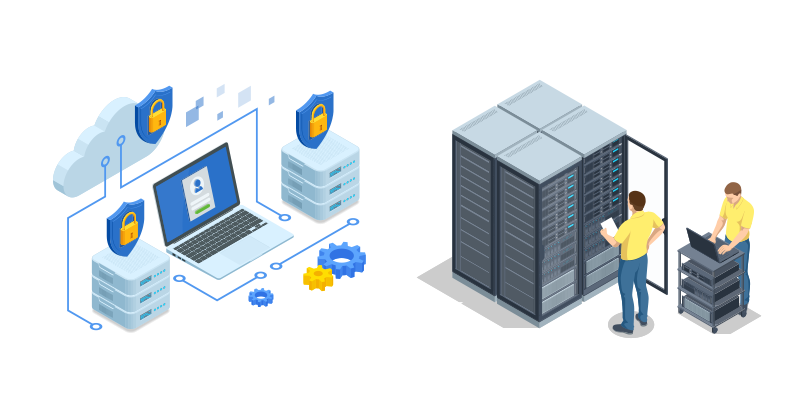Ensuring business continuity is an essential consideration for all businesses, ensuring that they can continue to function in the face of disruption. The use of the cloud helps to ensure business continuity by enabling access to company systems from anywhere, meaning that employees don’t have to be on company premises to carry out their jobs. As we saw several years ago, when the world went into lockdown overnight, it was those companies that already used cloud-based systems that experienced the least disruption to their operations.
Fear of Change
Migrating to the cloud from on-premise systems can be a daunting prospect, however. Fear is a great prohibitor of change, and there is no denying the fact that plenty of senior people across all industries have ‘grown up’ with on-premises servers and infrastructure. Doing things the way they have always been done is still a reason why many business owners and senior executives don’t want to consider an alternative. Whether they are just used to how they have always done things or they feel they, or their colleagues, lack the technical expertise to manage these sorts of project, it is still fear that prevents them from embracing technological advancements.
Key Benefits of Cloud
Cloud technology, however, offers many benefits to all types of business. If executives can alter any negative perceptions of technological change, then their business will be in a prime position to take advantage of the numerous benefits that migrating to the cloud offers. Let’s consider the benefits of cloud and how they can help your business:
- Security – this is arguably the most important benefit of migrating to the cloud. In-built security protocols offered by cloud providers offer a much greater level of protection than on-premise hardware. By its very nature, on-premise hardware is vulnerable to the threat of a physical breach, or hacking attempt, and needs to be securely maintained. It is also vulnerable to risks such as fire, flooding, or weather-related damage (dependent on where your business is located). Cloud technology protects business from all these risks and enables business continuity in the event of disaster.
- Cost-Efficiency – migrating to cloud can help reduce overheads by removing the reliance on on-premise infrastructure. Maintenance of on-premise hardware is a significant overhead for businesses – the upfront purchase as a capital expense, plus ongoing maintenance costs and employee resource overheads can be removed or reduced by migrating to the cloud. In addition, the flexibility offered by the subscription model turns costs into operational costs, rather than a capital expense, which supports cashflow.
- Scalability – hyperscaler cloud platforms offer infinite scalability and mean that companies only need to pay for the resources currently required. This avoids the need to over-provision on-premise hardware and the associated upfront costs and enables them to scale their compute resources as their needs increase.
- Performance – cloud computing offers higher performance than on-premise hardware, which usually necessitates a greater financial investment to match the performance of cloud. The scalability and performance of the cloud makes it better placed to meet the demands of growing businesses, while reducing overheads.
- Sustainability – whilst many have considered sustainability a nice to have in the past, running a cloud computing solution on renewable energy resources is becoming more and more important to companies that need to report on such matters. The risks of fines for not maintaining this matter as a priority is now a reality.
Business Continuity and Cloud-Based Systems
The benefits of cloud facilitate business continuity, ensuring organisations can continue to operate in the event of an emergency or disaster. The services offered by cloud providers include availability and redundancy, which means that due to their datacentres in a multitude of regions, other datacentres are available to minimise downtime in case of a disaster affecting a particular site. Automatic data backups minimise the risk of data loss, should the worst happen, enabling businesses to get back up and running as quickly as possible. Disaster Recovery as a Service is also an option available, which minimises the Recovery Point Objective (RPO) and Recovery Time Objective (RTO), and service providers must comply with strict Service Level Agreements (SLAs) to meet their contractual obligations. This offers resilience in the face of disaster and enables organisations to ensure business continuity.
How Can Ascarii Help?
There are numerous benefits to introducing cloud-based solutions to all businesses, and cloud-based ERP is no exception. As a cloud-first business, Ascarii has been implementing SAP Business One on our purpose-built AWS cloud platform for over ten years. Our team has the expertise, and qualifications in both AWS and SAP Business One, to ensure the smoothest transition to the cloud for your business. We work with customers every step of the way to implement cloud-based SAP Business One, which helps them to ensure business continuity and minimise risk, increase efficiency and reduce duplication of processes, and ultimately provide the platform on which to scale their business and compete effectively to set them up for future success. Contact our friendly team to find out how we can help you.


